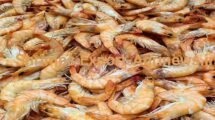Experts in fisheries and biotechnology have emphasized the importance of eliminating myths about the use of genetically modified (GM) crops as feed ingredients in India’s aquaculture sector. They believe that GM crop-based products (primarily non-living genetically modified organisms) have enormous potential for improving feed ingredient supply in aquaculture, promoting growth, and disease resistance, and lowering input costs in aquaculture production.
They were speaking at a Biotech Consortium India Limited (BCIL) awareness workshop on the use of GM crops and their derivatives in the aqua-feed sector, which was organized in collaboration with the ICAR-Central Marine Fisheries Research Institute (CMFRI).
The workshop emphasized that the introduction of GM crops in the aqua-feed sector would also help reduce the increasing demand for fishmeal and fish oil while also ensuring the sustainability of the aquaculture industry.
Also Read | NCP supremo Pawar supports GM crops and their trials in the country
According to Vibha Ahuja, Chief General Manager of BCIL, GM crops have several desirable characteristics such as insect resistance, disease resistance, and herbicide tolerance. As a result, employing these would be advantageous in increasing yield. According to a cost analysis, the use of dried distillers grains with solubles (DDGS), a co-product of cereals in the distillery industry, can help reduce shrimp feed prices. The majority of DDGS produced in the world, however, is of GM-corn origin, and Indian feed producers can reap the economic benefits if they are willing to use them as feed ingredients.
There are no negative consequences
To assuage various concerns about GM crops, Ahuja stated that no confirmed reports of adverse effects from approved GM crops have been reported in the last 25 years. ‘Systemic regulations are in place to ensure the safe use of genetically modified crops, which are monitored by internationally recognized safety assessment methodologies.’ As a result, an approved GM crop is just as safe as its non-GM counterpart,’ she added.
71 countries worldwide use GM crops and products for food, feed, and processing. According to Ahuja, there is a need for extensive research, field testing, and streamlining the approval procedures for cultivation, import, and use in the country.
Efforts have been streamlined
According to A Gopalakrishnan, Director of CMFRI, one of the primary benefits of GM crops in the aqua sector is their ability to increase the nutritional value of the feed. He claims that GM soybeans can be engineered to produce omega-3 fatty acids, which are essential for the growth and health of farmed fish, and that feed accounts for 50-55 percent of total input costs in aquaculture. Gopalakrishnan added that it is critical to developing streamlined regulatory efforts that take into account the ethics and risks associated with using GM plant ingredients in aqua feeds.
The workshop proposed that scientists working on fish nutrition, genetics, microbiology, and molecular biology collaborate. Also Read | Govt looking forward building sustainable economy through promising seaweed production


















Add Comment